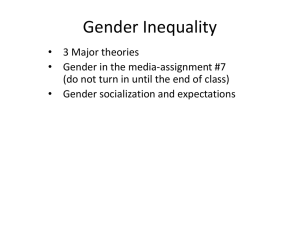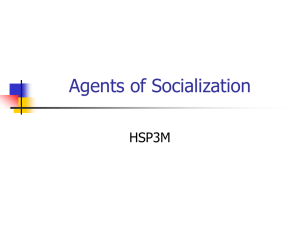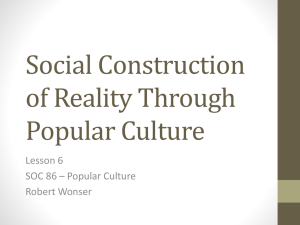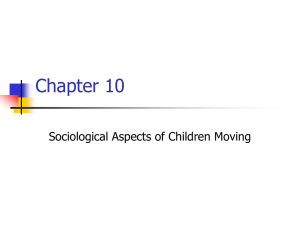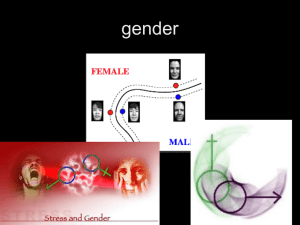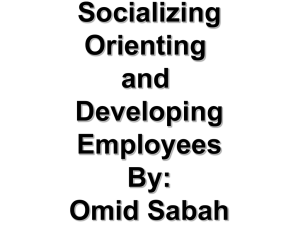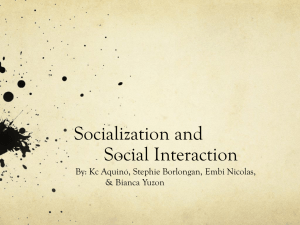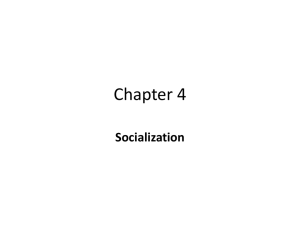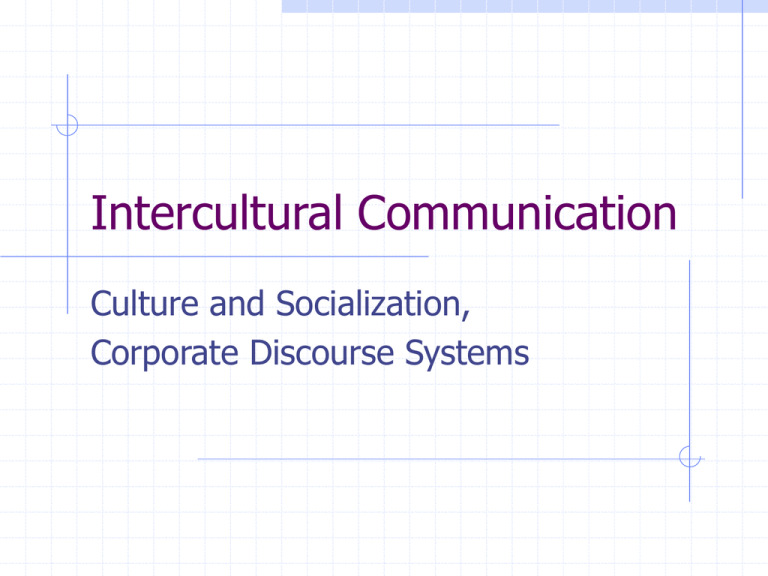
Intercultural Communication
Culture and Socialization,
Corporate Discourse Systems
E-pals Project
Due end of week 14 (Sunday)
Use Scollon and Scollon pp. 183-184 for
basic guideline of issues
Observation + direct questioning
Include short excerpts of interaction as
examples to support your points
Pay attention to the medium
Eg. MSN discourse system?
E-pals Project
Analyze yourself
What discourse systems do you belong to?
How do they influence the way you communicate
Analyze your e-pals
What discourse systems do they belong to
How do they influence the way they communicate
Analyze your interaction
Problems/successes
Similarities/differences
Conclusion and references
Discourse Systems
Ideology (Beliefs)
Face systems (Relationships)
Forms of Discourse (Patterns of
Communication)
Socialization
How people learn to be members of their
discourse systems
Culture is learned
Nature vs. nurture
Studies with twins
Eg. Studies on criminal behavior
What things are ‘innate’ or ‘human nature’?
Task
What things are learned?
Relationships
Beliefs
Patterns of Communication
Task
How did you learn to be Chinese
(or…)?
Socialization
In every group one has to learn the
rules, expectations, and truths of that
group, whether the group is your family,
the army, your school or company, or
the state (nation)
Socialization is the process through
which we learn to be a member of a
discourse system
Socialization vs. Education
Socialization
Informal
Continuous
Implicit
Uncredentialed
Education
Formal
Periodic
Explicit
Credentialed
Socialization vs. Education
Both valued in all societies
Valued in different ways
Socialization associated with ‘being
normal’
Socialization: associated with
Gemeinschaft
Education: Associated with Gesellshaft
Example: Gender Socialization
and Gender Roles
An important part of socialization is the
learning of culturally defined gender roles.
Gender socialization refers to the learning of
behavior and attitudes considered
appropriate for a given sex. Boys learn to be
boys and girls learn to be girls. This "learning"
happens by way of many different agents of
socialization. The family is certainly important
in reinforcing gender roles, but so are one’s
friends, school, work and the mass media.
Gender roles are reinforced through
countless subtle and not so subtle ways.
Agents of socialization
Religion
Work
Family
Peers
You
Mass
Media
School
Agents of Socialization
The role these different institutions play
in socialization differ in different
societies at different times
As well as for different individuals
Your parents’ generation
You
Me
The Cultural Revolution
Primary vs. Secondary
Socialization
Primary Socialization (enculturation)
Early in life
Within family or group of intimates
Secondary Socialization
Later in life
Outside primary group
Education and Secondary
Socialization
Education
Formal
Explicit
Socialization
Informal
Intuitive
Implict
Task
Watch the video
What do you think children learn
through this program?
What aspects of this learning are part of
education and which are part of
socialization
How Socialization Occurs
George Herbert Mead
Separation of self from others
Learning to use symbols
Observe others
Take the role of others
‘Looking glass’ self
Factors influencing
Socialization
Nature of humans
Motivation
Nature of the ‘self’
Individualistic vs. collectivistic
Human life cycle
When does adulthood begin?
Child-rearing practices
Shame Culture vs. Guilt Culture
BENEDICT R (1967) The Chrysanthemum and the Sword
Shame
Collectivistic
External sanctions
Face
Concept of duty
Hierarchical
Guilt
Individualistic
Internal sanctions
Concept of sin
Egalitarian
Guilt Culture
Guiltculture
I
Other people believe:
I didn't do it
I did it
I didn't do it
No problem
I protest my
innocence and
fight the
accusation
I did it
I am expected
to feel guilty
regardless
I am guilty
and am
punished
believe
Shame Culture
Shameculture
Other people believe:
I believe
I didn't do it
I did it
I didn't do it
No problem
I am shamed
and
dishonoured
by their belief
I did it
No-one
knows, so I
am not
shamed
I am guilty
and am
punished
Guilt and Shame
Heidi Fung
Role of stories told by adults about children
in Chinese socialization
Video
American child-rearing
practices
Child rearing practices reflect
Ideology
Face Systems
Forms of Discourse
American child-rearing
practices
1914-1928
Emphasis on limiting child’ self expression
Human nature is basically evil
‘Spare the rod and spoil the child’
1929-1945
Self-regulation
Influence of Scientific Management
Toilet training
American child-rearing
practices
1946-1964
Dr. Spock, Baby and Child Care
Self-expression/
Individual creativity
Comfort
NO HITTING!/ Talk it out
1964
Role of professional expertise
Complicated (scary) world
Media and technology
Technological solutions
Athakbaskan Child-rearing
Adults who comment on a newborn
baby ask, ‘Who came?’ The child is
thought to have an identity that is to be
discovered by those in this world, not to
be created or shaped by us. Thus the
role of the living in respect to the
newborn is to welcome this person and
to seek to learn about who he or she is.
Reflection
What kinds of principles do you think
your parents used to raise you?
How do you think these principles were
the same as/different from those by
which they were raised?
How do socialization practices reflect
the larger society?
Enculturation vs. Acculturation
Enculturation
Learning your own culture
Acculturation
One culture being dominated by another
Assimilation
Learning to adapt to a (dominant) culture
Cultural Adjustment
Re-entry

